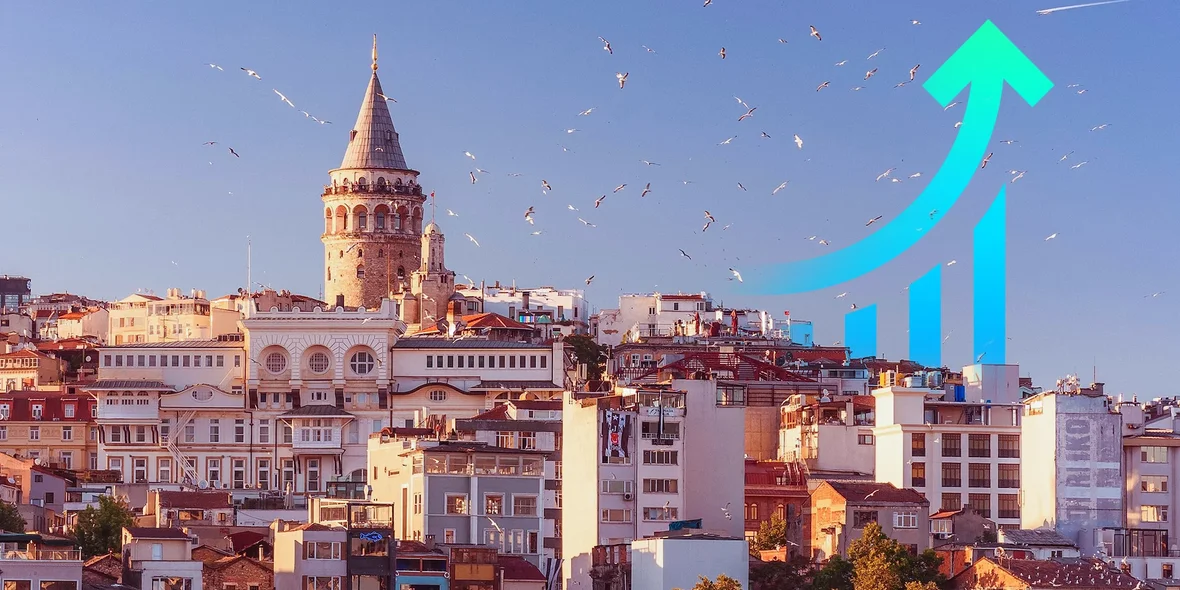
Lost prospects or a new round in the market? Review on the real estate market in Turkey. Analytics from REALTING
After the record year 2022 in the Turkish real estate market a "dark" streak came: the number of transactions is falling, the interest of foreign investors decreased, and it is absolutely unclear what prospects are to be expected further. To better understand the situation, how the Turkish real estate market has developed over the past decade and why the beginning of 2023 has literally knocked the soil off the feet of this market, read the article.
More than 1 million residential property transactions were made in Turkey every year
Based on the Turkish Statistical Institute data on the sale and purchase of real estate transactions.
Turkey can be recognized as one of the countries with the most developed tourism services sector. Nevertheless, Turkey is not only a tourist, but also an industrial country with one of the world’s strongest economies. Developed urban and international transport infrastructure, mild climate, multinational population, business opportunity, as well as a relatively simple and transparent procedure for buying real estate provide a stable demand for apartments and houses from both local residents and foreigners.
Between 2013 and 2022, more than 1 million residential real estate transactions took place in Turkey. The most notable growth in transactions occurred in 2015 and 2020 - both times by 11%. In the remaining years, only a slight change of 5 per cent was observed. The stable number of real estate transactions demonstrates the market’s resilience to external economic and political changes.
In 2020, the number-one deal leader, despite the onset of the pandemic, 1.5 million deals were concluded. The decline in mortgage interest rates contributed to this year’s growth. This is confirmed by the structure of transactions by the method of financing the purchase of real estate. In 2020, 38% of transactions were made using borrowed funds. For comparison, in 2018 and 2019, 20% and 25% of properties were purchased using mortgages, respectively. I.e. 13% more mortgage transactions were made in 2020 than in the previous period.
In addition, in 2019, the conditions for obtaining Turkish citizenship through the purchase of real estate changed: the cost decreased by 4 times from $1 million to $250 thousand. This event also influenced the increase in demand from foreigners.
As a result of the February earthquake in Turkey, the number of deals decreased. In January 2023, there were more than 97 thousand sales transactions. In February 2023 — about 80 thousand (the fall was 18%). The indicator of the first half of 2023 could not reach the level of the same period in 2022. The difference is 160 thousand transactions or 22%.
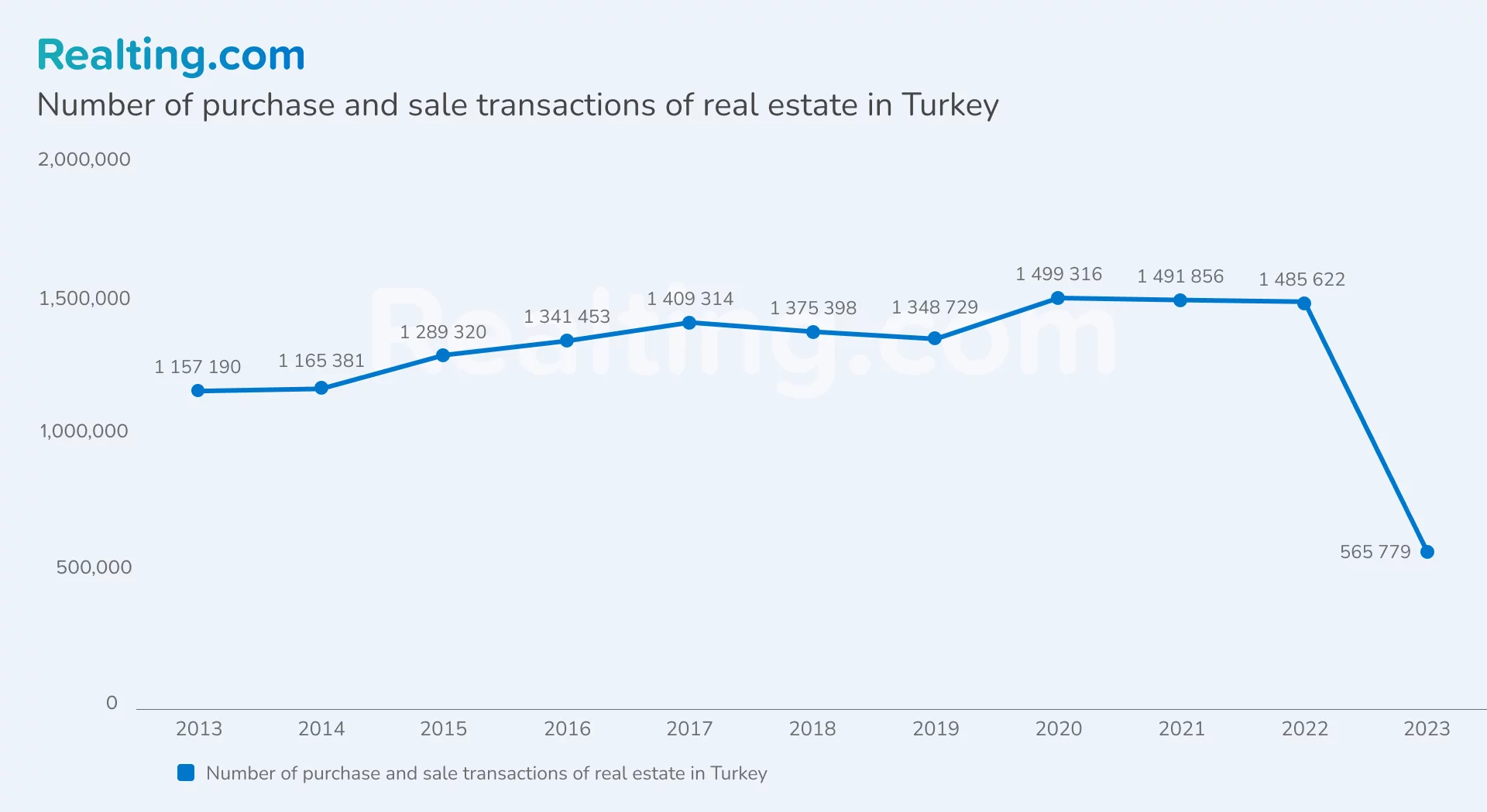
Buyers choose secondary housing more often
From 2013 to 2018, secondary real estate transactions were slightly larger than the primary - the distribution was 50/50: on average, "secondary" accounted for 53% of all transactions, and "primary" accounted for 47%. The trend changed in 2019, when the number of secondary real estate transactions increased by 9%. By 2022, 69% of secondary real estate transactions were made, and in the first half of 2023 — 70%. At the same time, in 2022 and in the first half of 2023 about 20% of transactions with secondary real estate were made with the attraction of credit funds and 80% using their own. Considering the primary market, there is a similar situation, but it is worth considering that banks approve mortgages only if the property is completed and commissioned.
Speaking about the purchase of new buildings and secondary market facilities should consider the risks in both cases. The purchase of a property on the primary market in Turkey always implies the share construction at the stage of the excavation; in this case, you should carefully choose the developer, pay attention to the reputation of the construction organization and the already leased properties. The advantage of equity construction is the commissioning of the property with repairs, as well as its location in a new residential complex with already developed infrastructure.
By the way, construction in Turkey has been expensive for several years and there are no reasons to reduce its cost. According to TURKSTAT, in May 2023, the construction cost index rose by almost 48% year on year; construction materials and wages rose the most. It is important to bear in mind that in the aftermath of the earthquake, construction is subject to strict State control and regulation.
The advantages of buying a property on the secondary market can be attributed to the fact that there is an opportunity to inspect an apartment or a house before buying. However, in the case of a purchase of a property in the secondary market, it is necessary to keep in mind the likelihood of legal risks associated with the presence of an encumbrance on the apartment. Bargaining in Turkey is part of culture, so buying a property from the owner can get a reasonable discount.
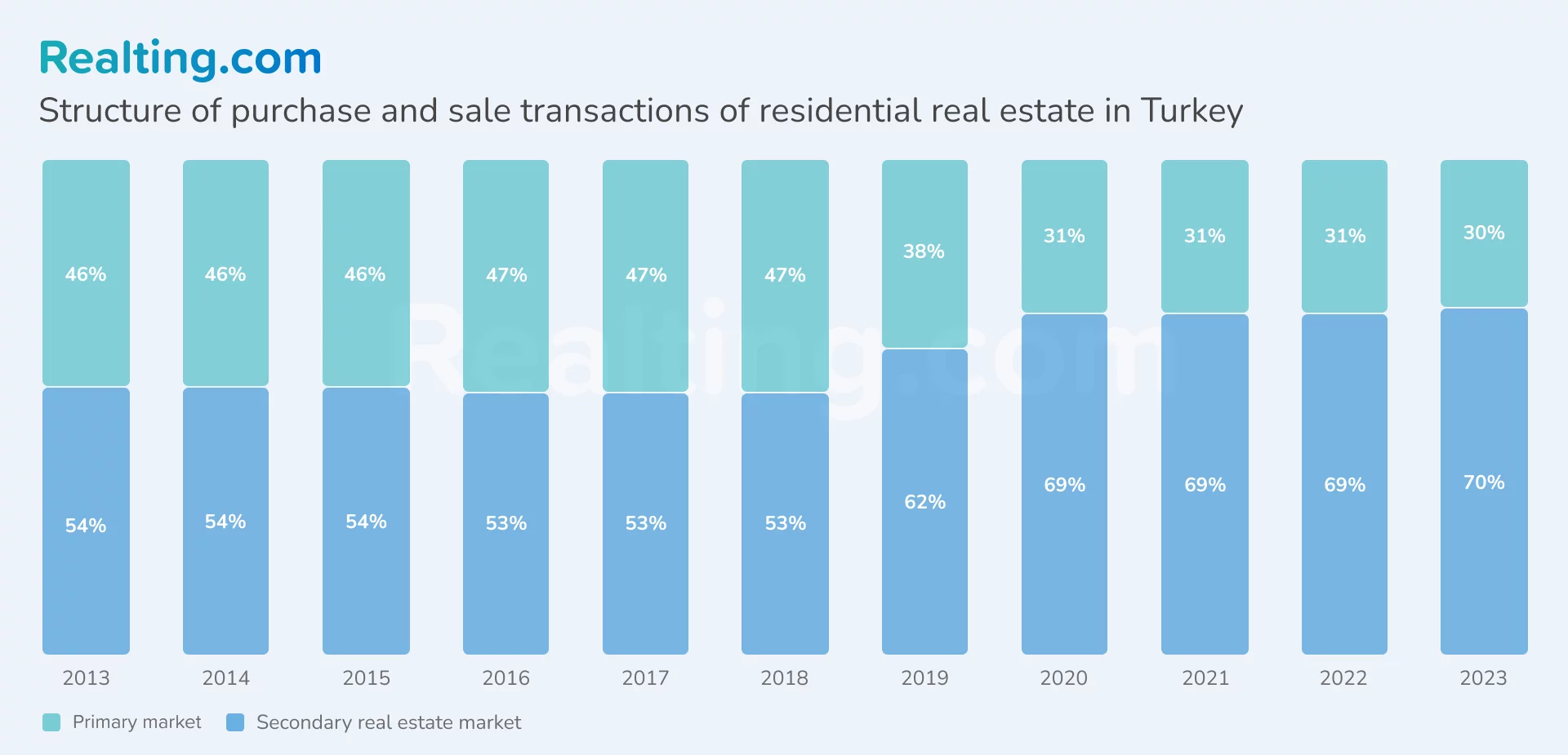
High inflation and unstable mortgage system
The country’s inflation rate has risen significantly in recent years, so the credit system can be described as unstable. Since 2021, about 80% of sales have taken place using own funds. Only in 2013 and 2020 can we note a high level of leverage — about 40%. In 2013, the investment attractiveness of Turkish real estate increased significantly, real estate prices showed an increase and mortgage rates decreased.
The features of mortgage in Turkey in 2023 should include: the term of lending up to 15 years, the mandatory presence of a guarantor with Turkish citizenship, the minimum initial contribution of 25%. In case of early repayment of the loan you will have to pay 2% of the remaining amount. Rates range from 6 to 18% per annum depending on the loan currency, bank and other conditions.
Another option for the purchase of real estate in the absence of the full amount of money is installments from developers.
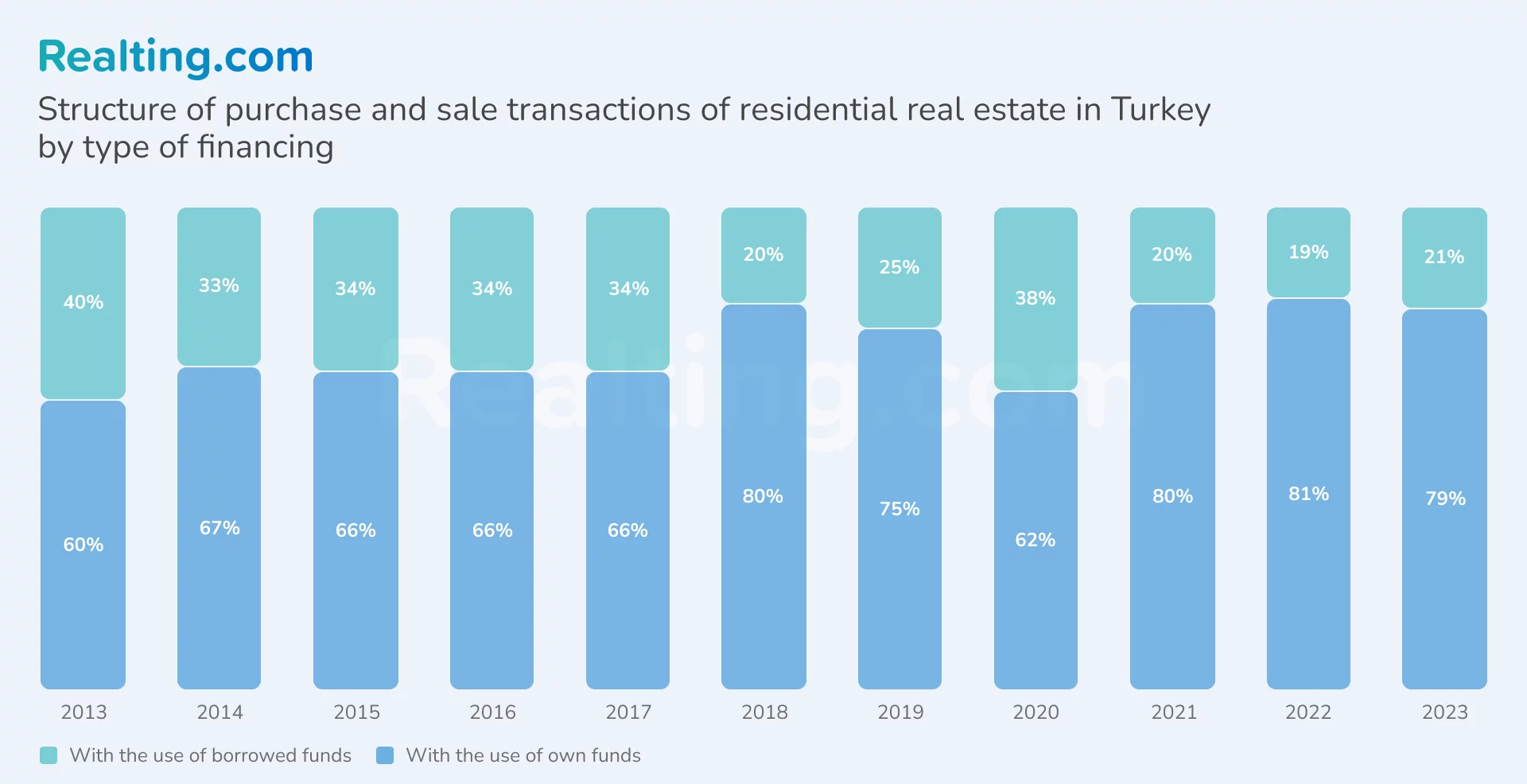
Number of foreign buyers is decreasing
Since 2016, the share of transactions in the purchase and sale of residential real estate with the participation of foreign citizens has been constantly increasing (except for 2020 due to covid restrictions). In 2022, 5% of all transactions were made with the participation of foreigners.
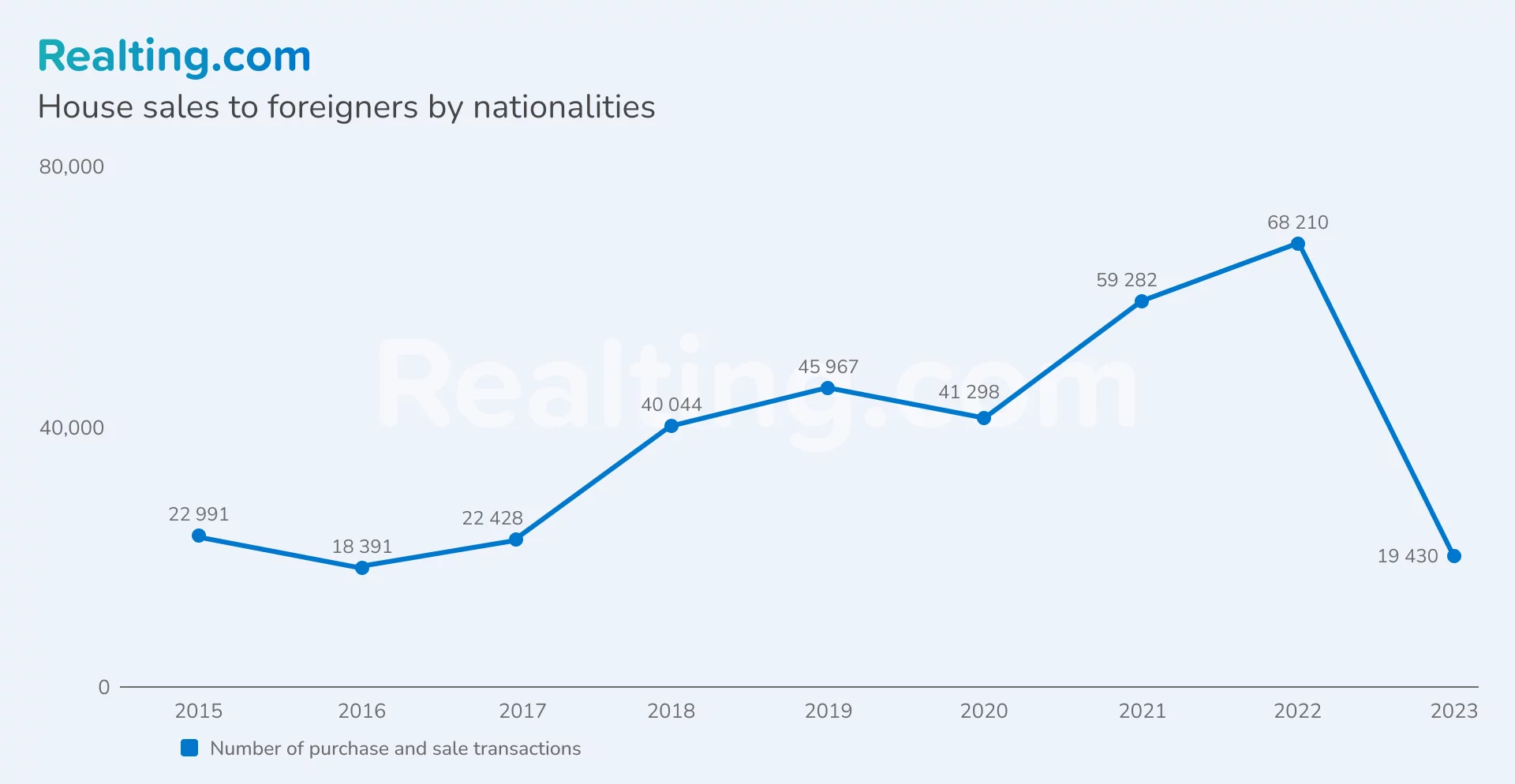
In the first half of 2023 almost 3.5% of all real estate transactions of the year were made with the participation of foreign citizens. For 6 months, most often, citizens of Russia, Iran, Iraq, Ukraine, Kazakhstan and Germany invested in Turkish real estate. In 2020 and 2021, Russians ranked third in terms of the number of real estate transactions — they accounted for 7% and 9% of all transactions with foreigners, respectively. In 2022, citizens of the Russian Federation made 15% more transactions with Turkish real estate than in 2021 and became leaders among other nationalities; as a result — 24% of all transactions with foreigners. Moreover, the peak of activity occurred in the 4th quarter — more than 7 thousand deals. This is most likely due to the desire to obtain a residence permit or Turkish citizenship. Tourist visa allows you to stay in the country only from 30 to 90 days.
But it should be noted that since 2022, the government of Turkey tightened the rules of obtaining citizenship and residence through the ownership of real estate: citizenship can now be obtained after buying a property worth at least $400 thousand. (previously $250 thousand), and residence permit is issued after acquiring a property worth at least $75 thousand. for the popular provinces (Istanbul, Antalya, etc. or $59 thousand for the rest of the regions).
Analyzing TURKSTAT data since 2015 on the sale of residential real estate to foreigners, it can be said that most often houses and apartments were bought by citizens of Iran, Iraq, Saudi Arabia, Russia, Germany, Kazakhstan and Ukraine.
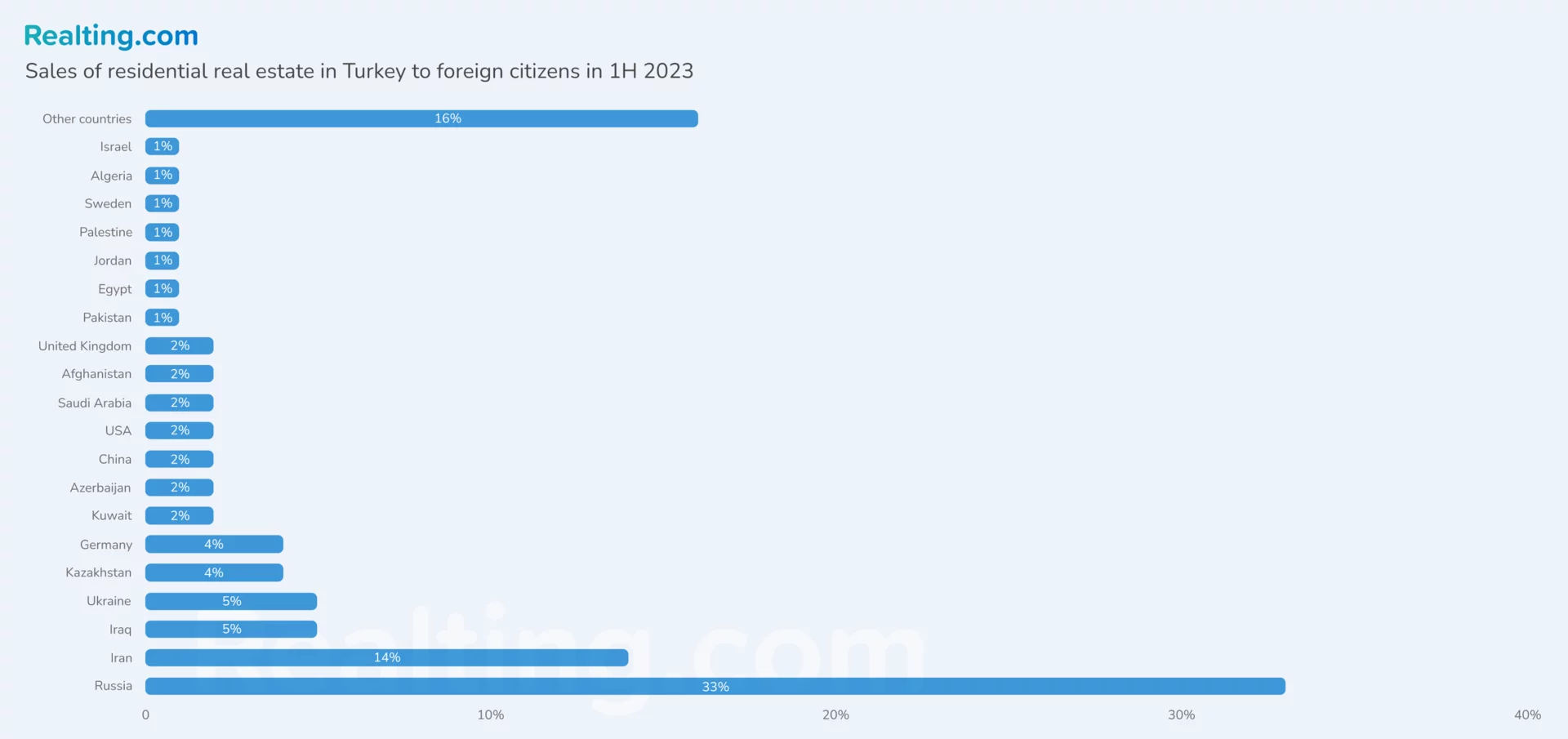
The most popular regions for the purchase of real estate since 2013 remain Istanbul, Ankara, Antalya, Izmir, Bursa.
At the moment, it is difficult to judge the prospects for the development of the real estate market in Turkey. The wave of migration to the country provoked a rapid rise in the prices of food, services, real estate, and the earthquake and the denial of residence permits for many expats was the final reason for the decision to leave the country. At the same time, the purchase of housing in the property in compliance with legal conditions does not always give investors the opportunity to obtain a residence permit and citizenship in a resort country, plus is not an affordable option for most foreigners. What will happen on the real estate market in Turkey in the future will largely depend on the migration policy of the state and the inflation rate.
Author
Providing readers with quality analysis on global trends in the real estate market.





















